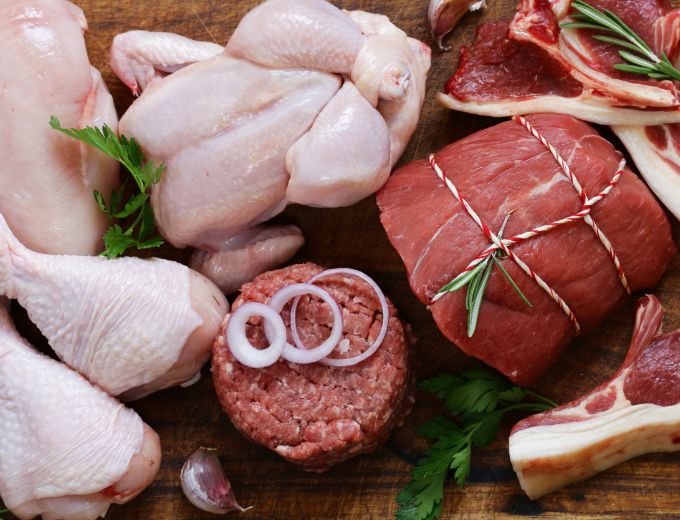I often get asked which diet is best for diabetes and diabetes prevention. Most often, I recommend intuitive eating for diabetes. But I don’t want to ignore science and new discoveries. Today, I’m answering the question, “Is the carnivore diet diabetes-friendly?”.
The carnivore diet is a fad diet that has been steadily gaining popularity thanks to social media. Influencers have ditched everything but the meat and boast great results. Weight loss, better skin, and improved blood sugars are a few of the claims that are associated with the elimination diet.
Low-carb diets are not new. Restrictive diets such as the carnivore diet have been a part of our lives for over a hundred years.
So what’s different about the carnivore diet? Rather than the usual emphasis on fruits and vegetables, the carnivore diet cuts out ALL carbs. No veggies, no grains, no nuts or seeds. Just meat and animal products.
People are choosing to eat only meat so that they can achieve their health goals. But what does the research say? Is carb-free the way to go? Is the carnivore diet diabetes-safe? Will the benefits make me change my mind about diabetes and intuitive eating?
If you’re new here, welcome! I’m Erin, an anti-diet dietitian specializing in diabetes, PCOS, and disordered eating. I have a passion for helping people heal their relationships with food while managing their health conditions.
Let’s get started!

What is the carnivore diet?
The carnivore diet is a diet that eliminates all foods except for meat and animal products. It bucks the conventional diet advice of increasing fruits and vegetables. In fact, it does the opposite.
No fruits and veggies make their appearance on a carnivore dieter’s plate. Neither do whole grains, nuts, seeds, legumes, or sweets of any kind.
Instead, the carnivore diet is a no-carb diet. After a few days of eating this way, you would be in ketosis. Ketosis is a state in which the body burns fat rather than glucose for fuel.
Some proponents of the carnivore diet claim that this is how the body is designed to eat. Similar to primal diets, it is thought that we are meant to eat as original hunters.
While there isn’t any calorie or carb counting, those following the diet are limited to a small range of foods.
Carnivore diet foods

The carnivore diet consists solely of animal products. The following foods are allowed on the carnivore diet:
- Red meat
- Eggs
- Lamb
- Chicken
- Fish
- Pork
- Turkey
- Organ meats
- Hard cheese
- Heavy cream
Carnivore diet: pros and cons
When I review any way of eating, I like to look at the pros and cons. What are the potential benefits of eating this way? Are there any drawbacks?
Health benefits
There are some short-term benefits for those following the carnivore diet. A low-carb diet will put the body in a state of ketosis. Because of ketosis, one would expect weight loss.

Low-carb diets are effective at reducing body fat and improving blood glucose levels. The issue is that the benefits are short-term. After 6 months, the benefits diminish.
One meta-analysis looked at studies comparing very low carb diets with more moderate recommended diets for those with type 2 diabetes.
Those who followed the very low carb diet had greater weight loss, reduced triglyceride levels, increased HDL (good cholesterol), and decreased diabetes medication usage.
These benefits continued until around the 12-month mark.
Of note, this trial found that low carb diets were effective and safe in those with type 1 diabetes. There was no increased risk of ketoacidosis, and the diet improved blood glucose control and reduced insulin demand.
Side effects
Ketosis doesn’t come without its side effects. If you’re in ketosis, you may experience:
- Dry mouth
- Fruity or bad breath
- Sleep disruption
- Fatigue
- Temporary decline in athletic performance
- Cramps
- Constipation or diarrhea
- Suppressed appetite
Usually, after a while, you’ll get used to being in ketosis. Some say they have more energy and greater mental clarity when they have gotten through the initial shock to the system.
Carnivore diet and gut health

The carnivore diet is certainly low in fiber. This is a concern. Not only for normal digestion and bowel movements but for your gut microbiome.
There is so much more to your health besides your weight. You can’t always see what’s happening in your gut, but your microbiome is ESSENTIAL to your overall wellness.
The gut microbiome is linked with diabetes risk and management. We know that foods like fruits, vegetables, and fermented, probiotic-rich foods fuel our gut bacteria.
On the flip side, diets high in red and processed meat may negatively alter the gut microbiome.
At this time, I can’t find research that shows the impact of an all-meat diet on the gut. Current research often pairs high meat intake with sugar intake—which is definitely different than the carnivore diet.
Carnivore diet and weight cycling

Weight cycling is the act of losing weight, gaining it back, losing it again, gaining it back again, and so on. Most people who have dieted know all about it.
Even those who take the most extreme measures to lose weight (i.e., weight loss surgery) gain weight back.
Most people who attempt restrictive diets end up yo-yoing. It often goes hand-in-hand with dieting.
There is a danger to your heart and metabolic health when your body weight fluctuates wildly. The American focus on reducing weight is failing.
Instead, we’d be better off health-wise if we ditched the scale and opted to improve our health behavior efforts.
For instance, increasing movement, adding in nutrient-dense foods, prioritizing sleep, and fostering relationships, are all beneficial, regardless of weight.
Carnivore diet and heart health
Again, the all-meat diet isn’t well studied yet. There is a TON of research proving that high red meat AND sugar intake increases the risks for all kinds of medical problems.
But what about meat without the sugar? What does it do to the heart? This review noted that animal-protein-centered diets are tied to oxidative stress and inflammation.

And this makes sense, given the diet cuts out vegetables and fruits. Not only are fruits, vegetables, nuts, and seeds delicious, but they pack in beneficial antioxidants and polyphenols.
Polyphenols are plant compounds that can reduce the risk of disease and improve overall health.
Sustainability
So how sustainable is the carnivore diet? Do you want to just eat meat at every meal? Every celebration, birthday, or night out with friends? NOT ME!
Variety is the spice of life! Don’t get me wrong. I’m a beef farmer, and I greatly appreciate a tasty steak or juicy burger. However, I also love a crunchy salad, creamy oatmeal, and buttery brown rice.
I can’t imagine going months without sweet potatoes, cookies, or a bowl of ice cream. Or an apple or carrot stick for that matter.
I don’t know about you, but I would be obsessed with all of the things I couldn’t have. And I’d be miserable.

Just picture how attempting this diet might go. You are strictly following the diet. Meat only. And then you decide to have a “cheat meal”.
That “cheat meal” turns into “cheat day”. Now you feel guilty. You binge on more “off-limit” foods. Instead of having a moderate diet that allows ALL foods, you restrict and binge.
Conclusion
While the carnivore diet may be safe for those with diabetes, I’m not backing it. I’m sure it comes as no surprise that I’m still a fan of intuitive eating for diabetes. The evidence doesn’t impress me.
Short term, the carnivore diet may get you some improvements in blood sugar and fat loss. But the long-term benefits don’t match up.
Even though I’m sure we often miss the mark when eating for our body’s design, I’m not convinced the carnivore diet hits it either.
We tend to diet in hopes of improving our health, but are we destroying our relationship with food in the meantime?
Do you need help navigating all of the fad diet messaging? Would you like to better your health and feel in control of your eating?
I can help! Book a free discovery call to see if my services align with your health and wellness goals.
References:
- Barber TM, Hanson P, Kabisch S, Pfeiffer AFH, Weickert MO. The Low-Carbohydrate Diet: Short-Term Metabolic Efficacy Versus Longer-Term Limitations. Nutrients. 2021;13(4):1187. Published 2021 Apr 3. doi:10.3390/nu13041187
- Rafiullah M, Musambil M, David SK. Effect of a very low-carbohydrate ketogenic diet vs recommended diets in patients with type 2 diabetes: a meta-analysis. Nutr Rev. 2022;80(3):488-502. doi:10.1093/nutrit/nuab040
- Turton JL, Brinkworth GD, Parker HM, et al. Effects of a low-carbohydrate diet in adults with type 1 diabetes management: A single arm non-randomised clinical trial. PLoS One. 2023;18(7):e0288440. Published 2023 Jul 11. doi:10.1371/journal.pone.0288440
- Zhou Z, Sun B, Yu D, Zhu C. Gut Microbiota: An Important Player in Type 2 Diabetes Mellitus. Front Cell Infect Microbiol. 2022;12:834485. Published 2022 Feb 15. doi:10.3389/fcimb.2022.834485
- Song M, Chan AT, Sun J. Influence of the Gut Microbiome, Diet, and Environment on Risk of Colorectal Cancer. Gastroenterology. 2020;158(2):322-340. doi:10.1053/j.gastro.2019.06.048
- Rhee EJ. Weight Cycling and Its Cardiometabolic Impact. J Obes Metab Syndr. 2017;26(4):237-242. doi:10.7570/jomes.2017.26.4.237\
- Najjar RS. The Impacts of Animal-Based Diets in Cardiovascular Disease Development: A Cellular and Physiological Overview. J Cardiovasc Dev Dis. 2023;10(7):282. Published 2023 Jun 30. doi:10.3390/jcdd10070282
- Fraga CG , Croft KD , Kennedy DO , Tomás-Barberán FA . The effects of polyphenols and other bioactives on human health. Food Funct. 2019;10(2):514-528. doi:10.1039/c8fo01997e
Disclaimer: This information is intended as a self-help tool for your own use, at your own risk. My opinions do not reflect the values, thoughts, or opinions of the Academy of Nutrition and Dietetics or other professional health organizations.
About the author
Erin is a registered dietitian and diabetes educator with almost 20 years of experience. She specializes in weight-inclusive diabetes care and prevention, intuitive eating, fitness, and women’s health. She works as a consultant and writer in the health and wellness space. Erin is passionate about empowering people to manage their own health and to have peace with food.


